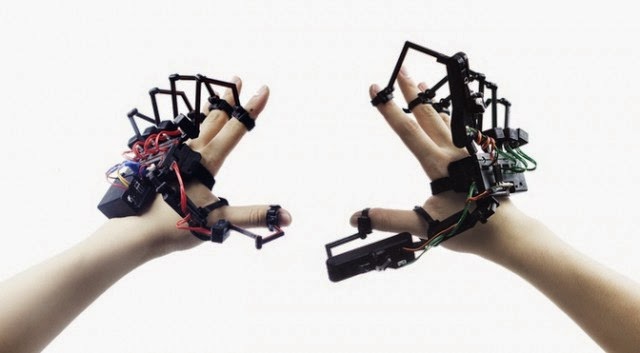Virtual reality is so much more than visuals, but most of what we’re used to seeing is little more than head-tracking and 3D imagery in a head-mounted display. For real immersion, VR is going to need to take advantage of the other senses as well. Touch and smell are just as important as sight and sound, but those are much harder problems to solve. Thankfully, a company by the name of Dexta Robotics is developing a peripheral to simulate the sensation of touch in a virtual world.
We’re on the brink of a massive wave of consumer-friendly virtual reality solutions. The Oculus Rift has stirred up enough interest over the last year or two that everyone from tiny engineering projects to giant corporations are investigating VR. However, nearly everything we’ve seen is focused on the motion-tracking and display parts of the VR equation. Thankfully, this mechanical exoskeleton dubbed the “Dexmo F2” is being designed specifically to give you the experience of touching a solid object.
Virtual reality for chickens is the future of farming, but is it also the future of humanity?
| The Oculus Rift paired with an omnidirectional treadmill creates an extremely immersive experience — but the sense of touch would take things to the next level. |
Unfortunately, this prototype doesn’t have the ability to convey exactly how firm the object in question is. As it stands, the brakes are either on or off — there is no middle ground. It’s disappointing, but remember that this is extremely early on in the life of virtual touch. To keep costs down, this early model doesn’t even have the ability to simulate touch on the other three fingers. The prototype will supposedly be available through a Kickstarter campaign later this month for under $200, so keep that in mind before you go off and pre-order a Dexmo F2 for your very own.
This implementation is bulky, cumbersome, limited in scope, and extremely unattractive, but don’t let that fool you. If we want real virtual reality, we have to go through some growing pains. Of course your grandpa is never going to strap on this weird mechanical spider, but this kind of research is a stepping stone to true Matrix-style immersion.



This weird exoskeleton adds the sensation of touch to virtual reality